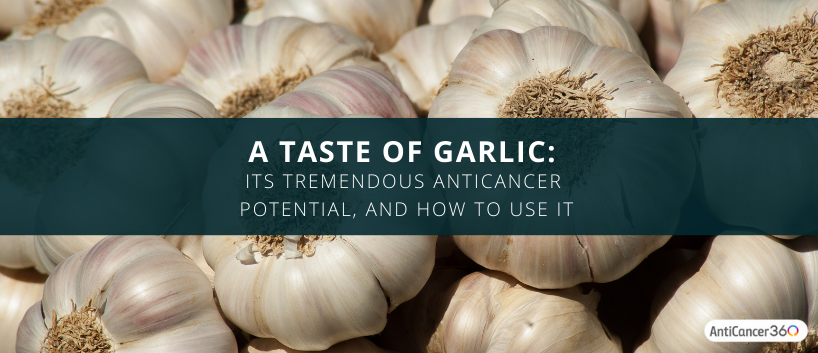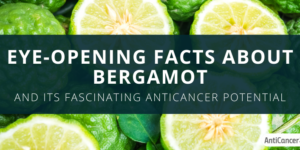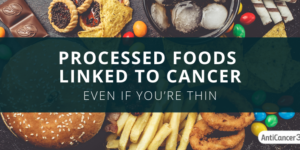“The food you eat can be either the safest and most powerful form of medicine or the slowest form of poison.” – Ann Wigmore (1909-1994) [1]
When you’re fighting cancer, it is crucial to support your body in every way possible. One of the best ways to do this is to eat healthy foods that nourish and strengthen your body.
There’s endless debate over the best food choices to help prevent or fight cancer. But whether you go with a vegan diet, low-carb diet, or another diet option, they all have two things in common: less processed (“junk”) foods and more whole foods. Whole foods are foods that are not processed (or minimally processed) before they reach the consumer. One example is garlic: a nutrient-dense food that adds a characteristic aroma and flavor to many dishes and has numerous health benefits, including anticancer effects.
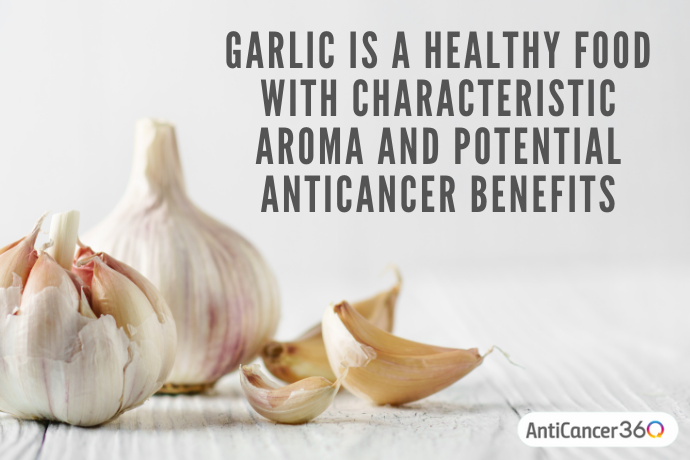
Overall, many anticancer substances and strategies can help you fight cancer from every direction. And as you’ll see, adding garlic to your meals —and as a dietary supplement— may be a worthwhile (and delicious!) addition to your overall anticancer approach.
The strategy of fighting cancer from every direction is crucial for advanced and late-stage cancer. In today’s post, we’ll explore the compelling research supporting garlic’s potential anticancer benefits and show you how to include it in your overall treatment program.
Garlic: Not Just A Recipe Ingredient
Garlic is a plant with a long history of culinary and medicinal uses. Also known as Allium sativum, the garlic plant contains phytochemicals with numerous potential health benefits, including anti-inflammatory, antioxidant, and anticancer effects. Several clinical trials have suggested a therapeutic role of garlic supplements for immune system support and heart and blood pressure health [2],[3],[4].
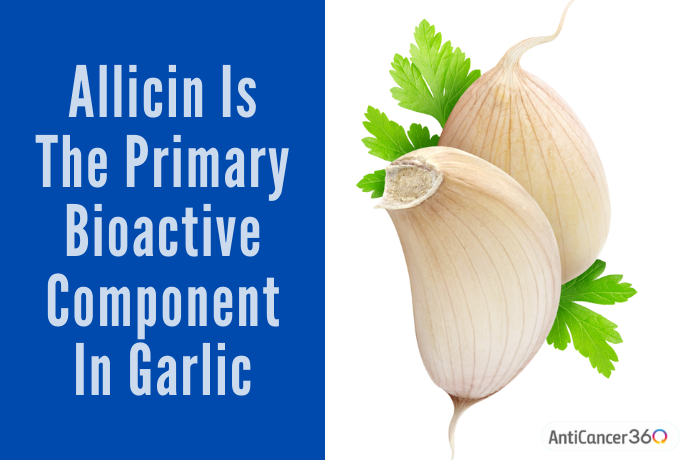
In today’s post, we will focus on the anticancer potential of garlic and its main bioactive ingredient: allicin, an organic sulfur compound. Much of the cancer research on garlic and allicin is limited to data from studies performed in labs, animals, or small groups of people. While these types of studies aren’t considered the strongest scientific evidence, they can provide insight into potential benefits and risks.
So, if you’re fighting a difficult or terminal cancer, you may be wondering if adding a garlic supplement could be helpful for you. To help illustrate garlic’s benefits, we’ll explore what science tells us about garlic’s effects on cancer cells and their metabolism.
Cancer Metabolism Suppression: How to Starve Cancer with Garlic
Metabolism is the process by which your body converts food into energy. This process involves many complex steps and chemical reactions within the body’s cells to change the calories from your diet (including sugars, fats, and proteins) into energy. Your body needs calories to move, grow, and do all of your daily functions that require energy. Unfortunately, with cancer, cancerous cells are also nourished and energized by the foods you eat.
Cancer cells have higher-than-normal metabolism to keep up with their rapid growth. In fact, cancer cells can often reprogram their processes of breaking down sugars, fats, and proteins to satisfy their constant appetite. So, a fundamental cancer-fighting strategy is to find ways to interfere with the metabolic processes in cancer cells.
In other words: we want to learn how to starve cancer. Our goal is to prevent sugars, fats, and proteins from feeding cancer cells while still nourishing the body’s healthy cells. This starvation strategy helps to weaken cancer cells, making them more vulnerable to treatments, such as chemotherapy. And one natural substance that shows potential in blocking cancer cell metabolism is garlic.
Garlic May Support Healthy Blood Sugar Levels
Cancer cells typically require large amounts of sugar (glucose) to satisfy their high-energy needs. Based on preliminary data, garlic may help block or hinder the flow of sugar into cancer cells.
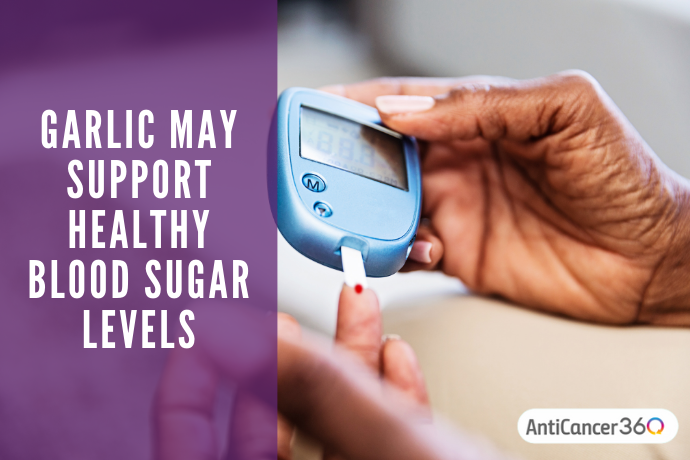
After consuming carbohydrates (foods or beverages that contain sugar), glucose enters our bloodstream. This signals the release of insulin, which signals our cells to move sugar out of the blood and into cells, where it gets transformed into energy. Based on studies of garlic vs. placebo in people with type 2 diabetes, garlic supplements may help reduce blood sugar levels and reduce resistance to insulin [5]. More research is needed to understand if this action is relevant to garlic’s anticancer effects.
When cancer cells can’t get enough sugar, they can activate other pathways to sustain themselves using fats and proteins.
Garlic May Disrupt Protein Functions in Cancer Cells
When cancer cells are deprived of sugar, they can adapt. This reprogramming leads to changes in how cancer cells metabolize proteins. Proteins are essential nutrients because they are made up of building blocks called amino acids. Cancer cells can break down protein into amino acids then reuse them to build enzymes and other functional proteins that help with cell growth and survival.
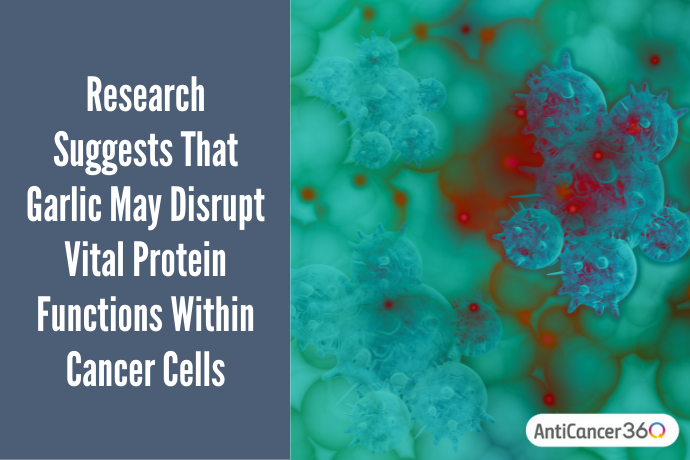
Some cancer research shows that allicin, the primary active component of garlic, can stimulate the activation of an enzyme (a type of protein) called AMPK. When AMPK is activated, it can cause another enzyme called mTOR to become less active [6].
Scientists are still learning about it, but mTOR (the “mammalian target of rapamycin”) is a protein that’s thought to regulate growth and metabolic control in all mammals, including humans. The mTOR pathway becomes hyperactivated during tumor formation in many cancers, leading to uncontrolled growth and proliferation.
Researchers have found that garlic may exert anticancer effects by reducing mTOR signaling in human liver cells. This finding suggests that consuming garlic may help to prevent liver cancer [7].
Another study suggests that garlic blocks growth and stimulates the death of prostate cancer cells. This study found that garlic interfered with the cells’ expression (production) of certain proteins [8].
Also, this study showed that allicin, the primary garlic component, can bind directly to receptors (“docking station”) of a protein called insulin-like growth factor (IGF). And this is interesting because IGF plays a major role in regulating the growth and survival of certain cancer cells, such as prostate cancer [9].
Another metabolic process involving proteins is autophagy, and garlic may also play a role in this process.
Garlic and Autophagy
Autophagy (literally defined as “self-eating”) is the body’s cell recycling system. It is a process that breaks down old or damaged cells into fragments. The salvaged pieces are then converted into energy or used to build new cells.
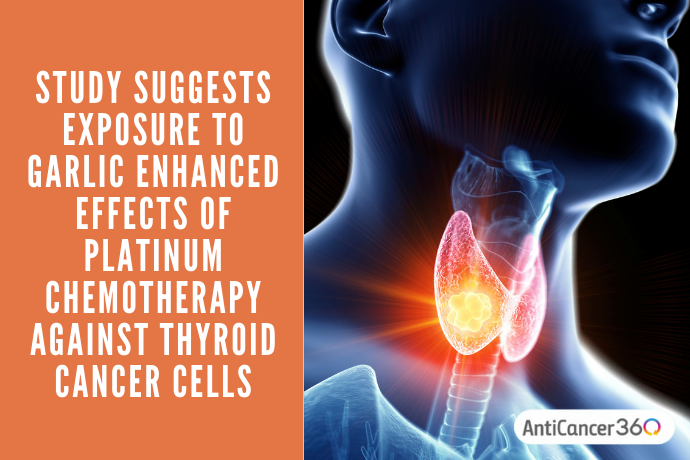
In some situations, autophagy can be a protective mechanism to help slow or stop tumor growth. The body’s healthy cells may try to remove precancerous or cancerous cells through tumor-suppressing autophagy. Some evidence suggests that garlic may play a role in enhancing this protective process against thyroid cancer cells [10].
In a 2018 study, using allicin with a platinum-based chemotherapy drug (cisplatin or carboplatin) resulted in significantly increased cell autophagy and reduced growth of thyroid cancer cells. Further, the study showed that allicin exposure led to autophagy-related cell death even after the cancer cells developed resistance to the chemotherapy drug [11].
Again, this data on garlic’s suppression of cancer metabolism is preliminary but definitely interesting. Next, we’ll look at evidence suggestive of garlic’s additional benefits related to cancer.
Garlic May Support Prostate Health
Allicin and several organic sulfur compounds have been isolated from garlic by scientists. Some evidence shows a connection between prostate health and these aromatic molecules. Here are just a few examples:
- Diallyl trisulfide (“DATS”), a compound found in garlic oil, was shown to have cytotoxic (cell-killing) effects. Interestingly, DATS exposure killed prostate cancer cells in the laboratory setting but did not kill healthy prostate cells [12].
- Diallyl disulfide (“DADS”) is another garlic oil compound. A study showed that prostate cancer cells exposed to DADS had significantly increased production of caspases. (Caspases are a family of enzymes that play essential roles in programmed cell death.) This finding suggests that garlic may be connected with inducing cell death in human prostate cancer cells [13].
- In a study of 27 men with benign prostate hyperplasia (BPH), consuming aqueous garlic extract daily for a month was associated with significantly lowered prostate mass and improved urine flow compared to baseline. This study also examined daily garlic use in 9 men with prostate cancer. While this group did not experience any change in prostate mass, they reported improvement in urinary flow and frequency [14].
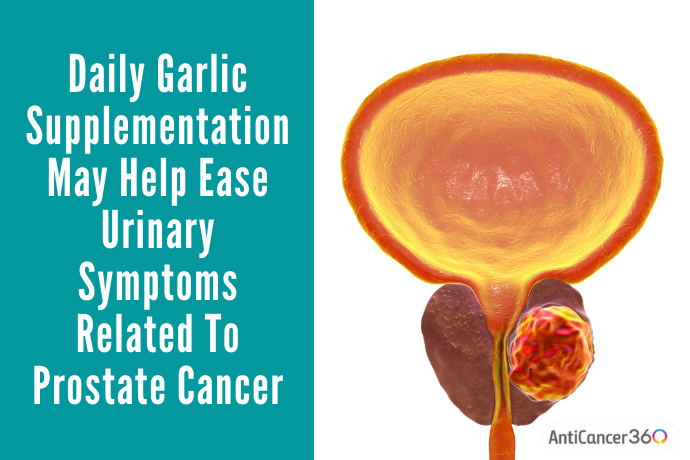
As we’ve outlined, consuming garlic may have beneficial health effects. Depending on your situation, garlic may be a valuable addition to your overall anticancer approach. Next, we’ll go over some guidelines on preparing garlic when you’re cooking with it and how to take it as a dietary supplement.
How To Use Garlic: Dosages, Side Effects, and Precautions
How to Prepare Garlic in the Kitchen
Garlic is a popular ingredient in many delicious recipes. Allicin is the main bioactive component of garlic, but it can be easily damaged or inactivated if you aren’t aware of how to prepare garlic to reap its full benefits. Here’s how it’s done [15]:
- When cooking, it’s best to start with fresh, raw, whole garlic.
- Peel the desired number of garlic cloves, then crush, mince, or slice the garlic according to your recipe instructions.
- The next step is crucial: let the garlic sit away from heat for ten minutes before cooking. During this time, the allicin is activated and should stay intact while cooking. Note: microwaving seems to damage allicin partially, but cooking garlic by other methods should not, as long as the garlic was crushed or sliced beforehand [16].
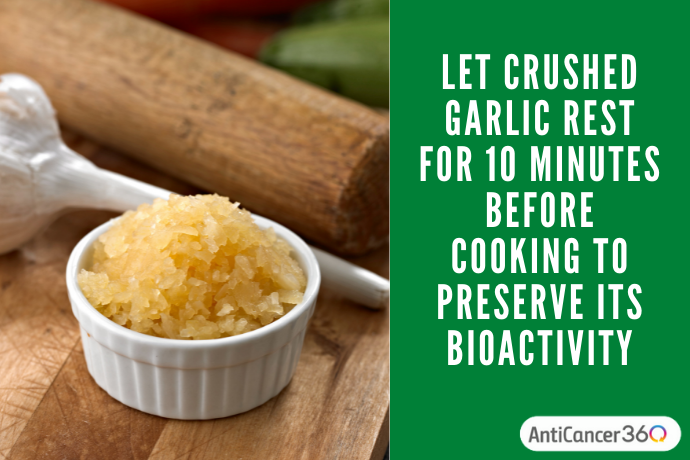
Letting garlic rest after it’s been crushed, minced, or sliced also helps to make its flavor stronger.
Garlic Dosage
Garlic supplements are often standardized to allicin content, with most formulations ranging from 1.1% to 1.3%. In clinical studies, dosages of garlic supplements have ranged from 150 mg to 2,400 mg per day [17].
Side Effects
Garlic is generally well-tolerated when taken orally. No harmful side effects have been seen during clinical studies lasting up to 7 years. The most common side effects reported are mild and may include [18]:
- Belly pain
- Passing gas
- Bad breath
- Body odor
- Nausea
Less commonly, allergic reactions have occurred with garlic. Additionally, regular consumption of garlic may have a thinning effect on the blood. While this may be beneficial for some individuals, it may be detrimental for others. Check with your healthcare professional before taking a garlic supplement.
If you are having a surgery or other medical procedure, it is recommended to stop garlic supplements 1 to 2 weeks before surgery or according to your physician’s instructions [19].
Drug Interactions
Garlic may interact with medications or other herbal supplements. Some possible drug interaction risks with garlic supplementation may include:
- Blood pressure medications. Taking garlic along with blood pressure medications, such as lisinopril or amlodipine, may lower your blood pressure more than usual.
- Blood thinners. Taking garlic along with warfarin, a blood thinner, may increase the risk of bleeding. This is because garlic could possibly affect the blood’s clotting process.
- Diabetes medications. Taking garlic in combination with diabetes medications may lower your blood sugar more than expected. Some examples of common diabetes drugs include insulin and metformin.
- Certain drugs are metabolized in the body by enzymes called CYP2E1 and CYP3A4. These enzymes could be affected by garlic in ways that could increase or decrease your exposure to these medications. If you’re taking any medications, ask your pharmacist for more details about this interaction risk before starting a garlic supplement.
If your healthcare professional feels that garlic may be beneficial for you and you’re currently taking one or more of the medication types above, they may suggest ways to manage and monitor for these interactions. Overall, many unknown potential drug interactions can happen with garlic, especially with chemotherapy and other cancer treatments. This is not a comprehensive list of possible interactions.
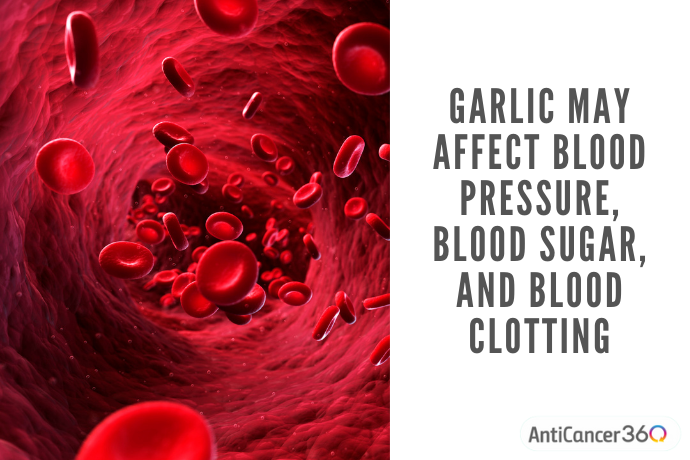
You should consult with your physician or pharmacist before including any supplements in your program.
Garlic as Part of an Aggressive, Integrative Anticancer Approach
Every cancer treatment has possible risks to consider. However, the potential benefits of garlic, a generally safe and natural supplement, may outweigh the risks. Because of the risks for drug interactions with some oncologist treatments, you must talk with your doctor or pharmacist before adding garlic to your overall anticancer program.
And ultimately, when using the “Aggressive Integrative Approach” to cancer, the goal is to fight cancer from every possible angle. This approach includes integrating natural supplements into your routine to help fight cancer.
The anticancer potential is primarily based on limited scientific data, but this integrated approach can be done safely with your oncology treatments.
Depending on your unique situation, why not fight cancer from every possible angle?
How are you taking control? What role are you taking in your fight against cancer? What natural or dietary supplements have you tried, and what changes have you noticed since you started them? What questions or concerns do you have about garlic? We would love to hear from you. Please leave questions or comments below!
Please talk with a healthcare professional and consider the risk-versus-benefit potential before starting garlic or any natural supplement.
Are You A Good Candidate For Our Program?
If you’d like to learn more about AntiCancer360 and find out if we can help you, please watch our free online webinar to learn more about our approach. At the end of the webinar, you’ll be able to schedule a free call with us so that we can discuss your case in detail.
Dr. Patricia Weiser is one of AntiCancer360’s consultant pharmacists, science advisors, and medical writers. Her expertise helps us create safe herbal and supplement combinations and avoid potential drug interactions.
Patricia is a graduate of the University of Pittsburgh and a licensed pharmacist. She has clinical experience in both community and hospital pharmacy. She is passionate about integrative and preventative care and strives to empower her patients to take an active role in their health.

